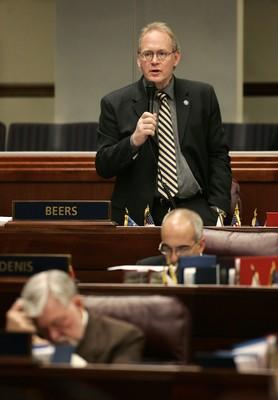Tip sharing proposal revived

CARSON CITY — A bill to stop Wynn Las Vegas from requiring dealers to share their tips with supervisors, died in the Assembly Judiciary Committee more than a week ago.
On Tuesday, the provisions in that bill were revived and placed in Assembly Bill 248, which passed 32-10.
“We wanted to send a clear message that people who receive gratuities are not to be interfered with by management,” said Assemblyman Bernie Anderson, D-Sparks.
The bill was the last approved by the Assembly as members beat a Tuesday deadline to have legislation receive approval from at least one house of the Legislature.
The original tip bill, Assembly Bill 357, had been devised by Assemblyman Bob Beers, R-Henderson, because of the tip sharing order in September at Wynn Las Vegas.
Beers was pleased with the move to revive his proposal.
“This does essentially what my original bill did,” he said. “This protects those people who depend on tips for their living.”
Under AB248, casino employees, such as dealers, who help patrons may pool their tips with other workers. But a casino worker who does not customarily receive tips “may not participate in an agreement to pool tips and gratuities.”
Anderson, the chairman of the Judiciary Committee, said the original bill failed because of a lack of time for members to agree on amendments.
According to the Legislature’s Web site opinion poll, nearly 1,600 people supported that bill, compared with 60 against.
At the hearing on the original tip bill, Wynn executives said the tip sharing move was done to correct what had been a widening disparity between the wages earned by dealers and casino floor executives.
In an interview, Anderson said pit bosses often do not make much more than dealers. But he said they often voluntarily decide to take that job, considering it a step up from being a dealer.
“Their hourly wage is different, higher than dealers and they can count on that,” he added.
But dealers might receive only $200 to $300 a week in take-home pay, Anderson said.
“Having worked my way through college in a casino, I know how dependent on tips people are who work in gaming,” Anderson said. “Those are minimum-wage jobs. They depend on tips to live on.”
While some Las Vegas dealers might make $80,000 to $100,000 a year in tips, he said, that is not the case everywhere, especially in Northern Nevada.
All 27 Democrats and five of the 15 Republicans in the Assembly supported the bill.
Assembly Minority Leader Garn Mabey, R-Las Vegas, said they did not receive the amendment until 30 minutes before the vote. That was not enough time to consult people in the gaming industry, he said.
As a principle, he said, Republicans don’t “want to dictate to businesses how they run their businesses.”